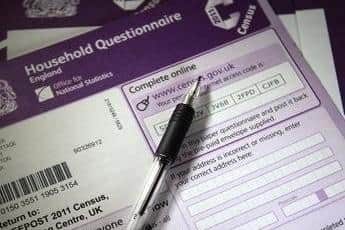First census in Northern Ireland to track sexual orientation finds 2.1% of population identifies as lesbian, gay, bisexual or other
and live on Freeview channel 276
The first census in Northern Ireland to track sexual orientation has found that 2.1% of the region’s population identify as lesbian, gay, bisexual or other.
The Census 2021 figures, published on Tuesday, found that 31,600 people aged 16 or over in the region identified as LGB+.
Advertisement
Hide AdAdvertisement
Hide AdSome 1.364 million adults (90%) identified as straight or heterosexual, and 119,000 (8%) did not answer the question, or preferred not to say.


By location, 4.1% in Belfast identified as LGB+ compared with 1.1% in Mid Ulster.
The figures indicate that Northern Ireland has the lowest percentage of people in the UK who identify as LGB+, after Wales (3%) and England (3.2%).
The Scottish census was run separately a year later.
The latest information, released by the Northern Ireland Statistics and Research Agency (Nisra), also looks at employment, qualifications and marital status.
Advertisement
Hide AdAdvertisement
Hide AdIt found that of 1.515 million adults in Northern Ireland, 849,000 (56%) were in employment, 42,000 (2.8%) were unemployed and 624,000 (41%) were economically inactive due to being retired, long-term sick or disabled.
Around one in three said their highest level of qualification was a degree/NVQ 4 or above, while just under a quarter said they had no qualifications.
In terms of marital status, there has been a fall in the percentage of adults who are married over the last six censuses, from 61% in 1971 to 46% in 2021, and a rise in those who are single from 31% to 38%.
Around 7% of the population aged three or over (127,000) said they could speak Irish, and of those, 70,000 said they spoke Irish at least once a week.
Advertisement
Hide AdAdvertisement
Hide AdSome 3.3% (61,000 people) aged three and over said they could speak the Ulster-Scots language, and 41,000 of those said they spoke Ulster-Scots at least once a week.
In terms of population make-up, 13.5% (257,000) were born outside Northern Ireland, with 105,000 having come to live in the region in the last 10 years, and 66,000 having arrived between 2001 and 2010.
Census 2021 was carried out in March last year.
The Rainbow Project welcomed the release of the results around sexual orientation but expressed disappointment that the census did not include questions on gender identity.
John O’Doherty, Director of the Rainbow Project said: “The LGBTQIA+ Community have always existed in Northern Ireland, but we have been a hidden population.
Advertisement
Hide AdAdvertisement
Hide Ad"This is partly due to repeated failures by government and public bodies to carry out their statutory duty to collect and record data on sexual orientation and gender identity. Today’s release is a meaningful first step towards ensuring all LGBTQIA+ people are counted and visible within our society, but there remains much to be done.
“While this is an important first step towards ensuring all LGBTQIA+ people are counted, today's release should be viewed as a baseline – and not a full reflection of LGBTQIA+ populations in Northern Ireland.
"The 2021 census provided an opportunity to record and report on the numbers of LGBTQIA+ people across the UK. We are disappointed that changes were not made to allow for gender identity data to be gathered in the Northern Ireland census leaving a further gap in the inclusion of LGBTQIA+ people.”
Aisling Playford, Policy and Advocacy Manager at The Rainbow Project added: “The census data on sexual orientation will help us to ensure that policymakers, service providers and community & voluntary sector organisations understand the needs of LGBTQIA+ people and can help us to develop tailored services to address inequalities experienced by this community and to help LGBTQIA+ people achieve their full potential.
Advertisement
Hide AdAdvertisement
Hide Ad"The Rainbow Project will continue to focus on greater inclusion of LGBTQIA+ people in the development and implementation of policies, services and strategies and ensure that these are working to improve the lives of all people. We will continue to work to ensure that LGBTQIA+ people can access dedicated specialist services when they need them, regardless of their location in Northern Ireland.”